Florida Sea Grant is proud to announce four graduate students from Florida Atlantic University, Florida State University, the University of Central Florida, and the University of Florida were selected as finalists to represent the state in the 2025 John A. Knauss Marine Policy Fellowship cohort.
The Knauss Fellowship program, sponsored by the National Sea Grant College Program since 1979, has a 45-year history of offering graduate students a one-year fellowship in marine policy-related positions in the legislative and executive branches of the U.S. federal government. Fellows and their host offices work together on policy decisions that affect our nation’s coastal, marine, and Great Lakes resources.
“Year after year we continue to advocate for value of the Knauss Marine Policy Fellowship. That is because we are lucky in the state of Florida to welcome an expanse of talented students passionate about making positive and lasting change in coastal and marine sciences,” says Dr. Sherry Larkin, Florida Sea Grant Director. “This cohort is no different, and we are proud to have each of them represent Florida Sea Grant as they embark on this new chapter of their careers and be the voices of change for our oceans and coastal communities.”
Knauss finalists are chosen through a competitive process that includes comprehensive review at both the state and national Sea Grant program levels. The four Florida finalists join a national cohort totaling 71 Executive and 17 Legislative finalists selected from a competitive pool of nominees representing—for the first time—all 34 Sea Grant programs in the coastal and Great Lakes states and territories.
This cohort’s finalists are no strangers to Florida Sea Grant. Collectively, their involvement varies on FSG projects related to aquaculture and coral communications, healthy coastal ecosystems, and fisheries management.
Meet the 2025 Finalists from Florida:
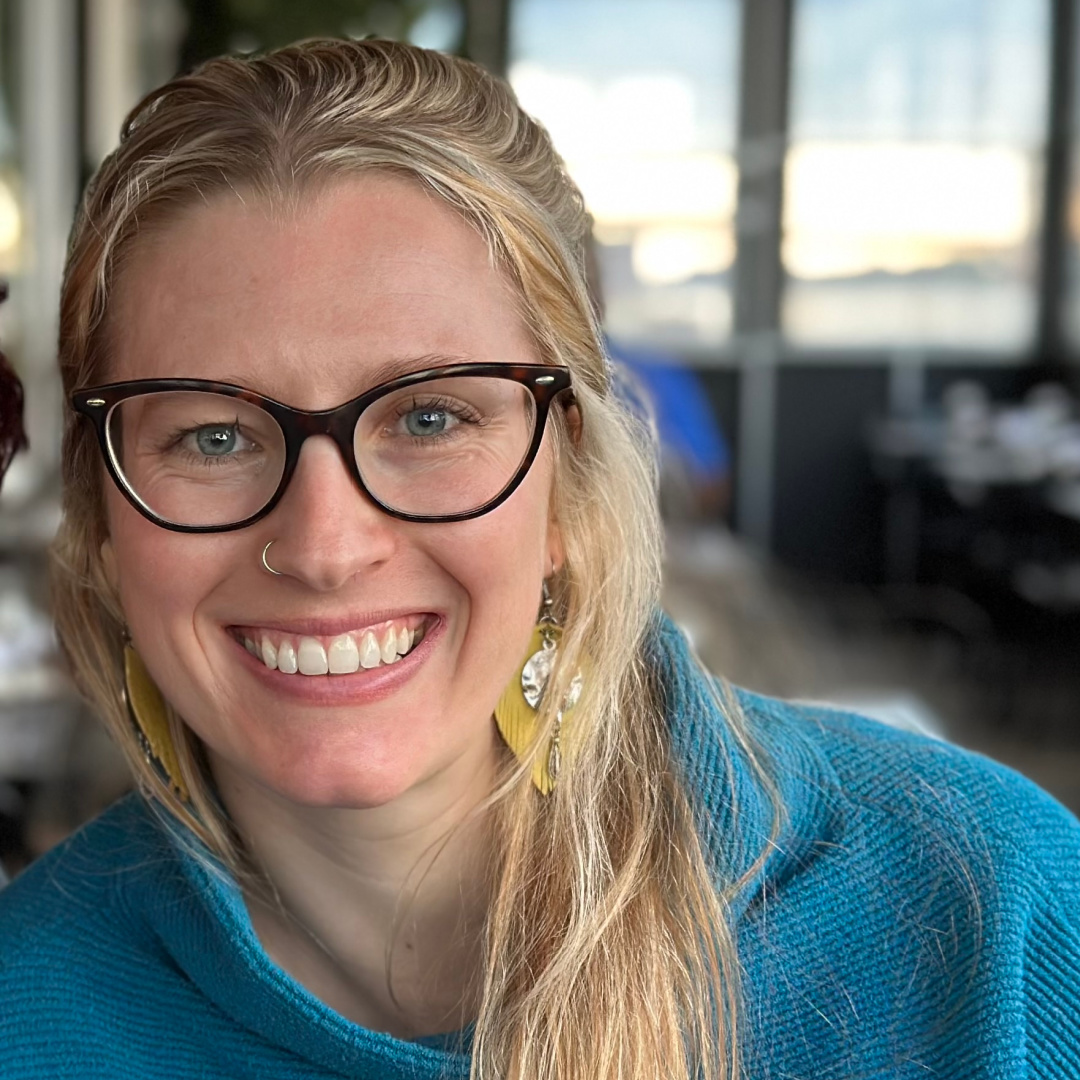
I believe good public service is grounded in strong communication with the public you are serving and a nuanced understanding of community values, systems, and needs.
Hayley Lemoine
Hayley Lemoine
Florida State University
Executive Branch
Hayley Lemoine is a Ph.D. Candidate in the Department of Geography at Florida State University (FSU), under advisor Dr. Sarah Lester. With her research focusing on the social dimensions of seafood, Hayley’s long-term goal aims to increase sustainability, equity, access, and resilience in seafood systems. The Knauss Marine Policy Fellowship provides an opportunity for her to gain valuable experience and skills in the world of policy, and, combined with her aptitude for creative problem-solving, Lemoine hopes to help “bridge gaps between local communities’ needs and government resources.”
Prior to her selection as a finalist for the 2025 Knauss cohort, Lemoine engaged with Florida Sea Grant in other roles. She served as a 2021-2022 HARVEST intern under the mentorship of Dr. Laura Tiu. During her internship, she wrote a “Manual for an Aquaculture Permitting Pathway”, documenting Ocean Era’s experience navigating the offshore aquaculture regulatory process for their pilot project, Velella Epsilon, in the Gulf of Mexico. Additionally, Lemoine became the first FSG Aquaculture Communications Graduate Fellow. As part of her fellowship, Lemoine served on the planning committee for the Women of the Water Conference and published a blog series titled AquaCurious, which discusses important and popular topics related to aquaculture in the U.S.
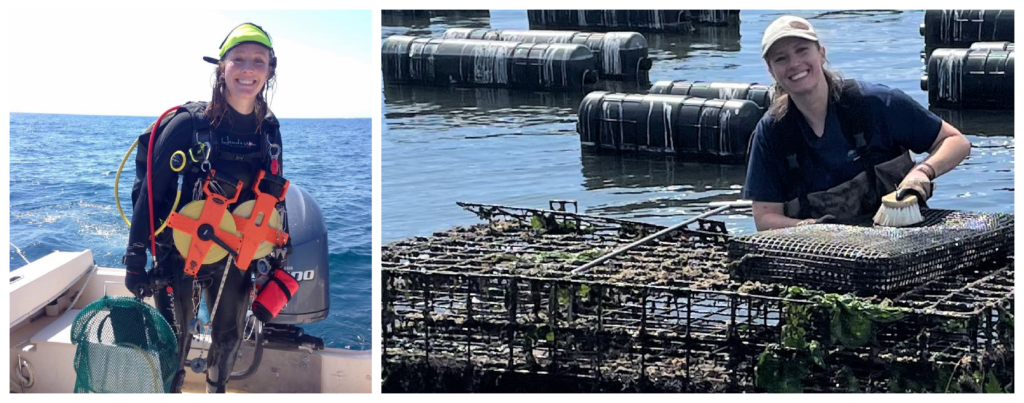
Lemoine is also a Research Associate on a project with the NOAA Southeast Fisheries Science Center where she works with Dr. Adriane Michaelis to examine the social acceptance of aquaculture via stakeholder interviews and public focus groups. As part of a partnership between Dr. Lester’s lab at FSU and the National Sea Grant Law Center, Lemoine compiled state-level marine aquaculture laws, regulations, and relevant policies for all 23 coastal states for a publicly accessible database with an interactive dashboard.
With a passion for service and community, Lemoine has paved her own path toward the Knauss Fellowship through ready involvement, pursuing opportunities through listening to the needs of others and acting as a voice to connect those needs with decision-makers. As Lemoine steps into the role of Knauss Fellow, she aims to gain a deeper understanding of the complexities of governance and use that knowledge to continue supporting communities in resolving the challenges they face every day.
What is Hayley most looking forward to as a 2025 Knauss Fellow?
“I am looking forward to working on projects and issues I care about with a new group of colleagues while expanding my understanding of how the federal government affects change.”
Placement Office:
NOAA NMFS, International Affairs Division
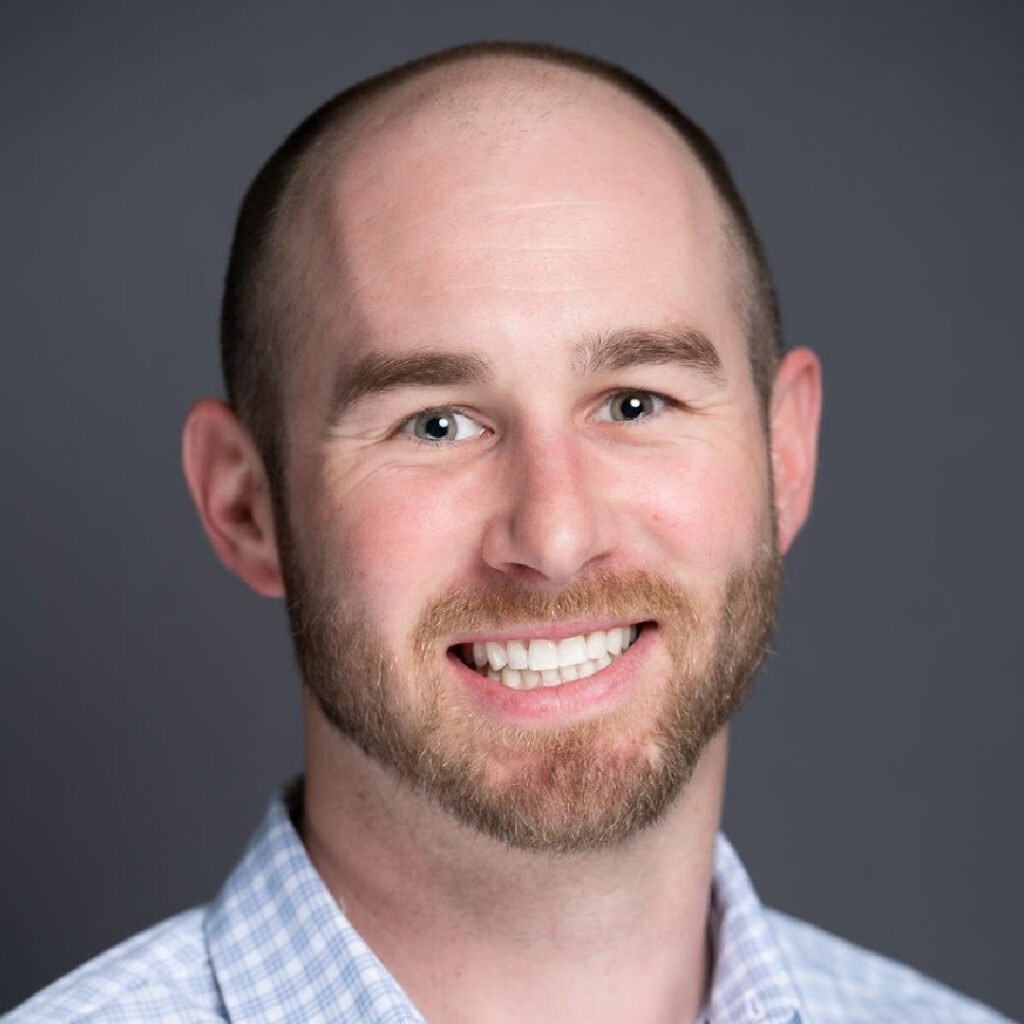
I welcome responsibility with relentless resourcefulness, and I am grateful to be constantly curious, as education is a lifelong process. I aim to carry this momentum of public service throughout my fellowship while expanding the scope and scale of my scientific stewardship.
Clark Morgan
Clark Morgan
Florida Atlantic University, HBOI
Executive Branch
Clark Morgan is a Ph.D. Candidate of Integrative Biology: Marine Science & Oceanography at Florida Atlantic University (FAU) at the Harbor Branch Oceanographic Institute (HBOI), under advisor Dr. Matt Ajemian. Morgan’s Ph.D. dissertation investigates the effect of movement ecology on fisheries for adult Atlantic goliath grouper, generating information for improving the conservation and management of native protected species of critical ecological and economic value. His expertise allows him to approach fisheries management as a “simplified triad: an intersection of policy, biology, and socioeconomics,” as Morgan describes. Combining his academic background and research, Morgan strives to advocate for public environmental literacy by translating these topics into meaningful discussions. He describes himself as a public servant in search of “expanding the scope and scale of my scientific stewardship.”
While Morgan’s research experiences span the globe, he began his journey at Florida State University (FSU), where he participated in the NOAA-NMFS Cooperative Atlantic States Shark Pupping and Nursery Survey Program (COASTSPAN). As an intern at the Shark Research & Conservation Program at Cape Eleuthera Institute, Morgan contributed to ongoing research studying stress physiology responses of Caribbean reef sharks to longline fishing capture. Data from this project was analyzed and used for his undergraduate thesis. Before beginning his graduate studies at the University of North Florida, Morgan spent time as a Research Assistant with Florida International University on the Shark Bay Ecosystem Research Project in Western Australia. He worked at a remote field station to maintain seagrass resilience experiments via scuba diving, studied fish communities, and tracked large sharks and sea turtles for behavioral ecology studies.
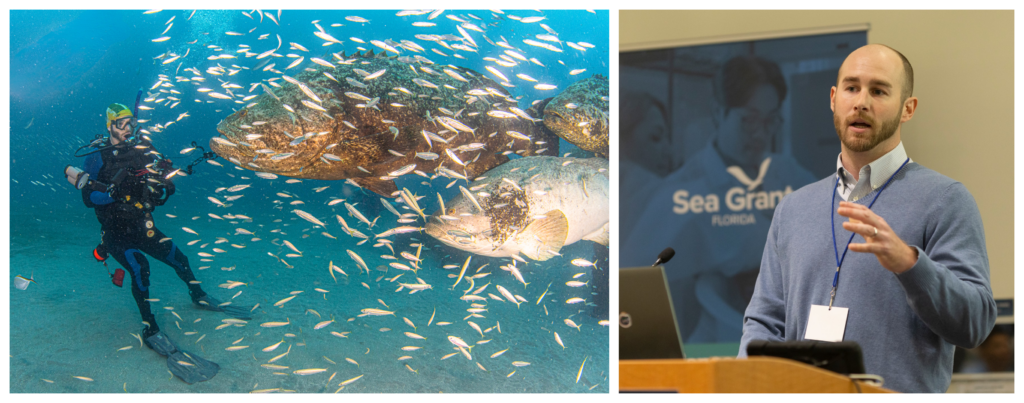
Morgan’s commitment to understanding and supporting communities stems from his family history of public service, and a strong sense of empathy he credits to inheriting from his mother. This inspires him to connect with other people when bridging science and public policy within the communities he serves. Leveraging how community livelihoods can depend on the work of scientists and policy-makers, he approaches his work with the goal of understanding that all perspectives can impact decision-making.
Through the lens of professional photography and a long history with diving, Morgan brings a unique perspective to provide an immersive experience for people of all ages. Highlighted by his 2022 Florida Outdoor Writers Association (FOWA) Scholarship, Morgan believes that while strong science is important for fisheries management, it has less impact if not effectively communicated to produce change in public perception and policy. Morgan’s childhood fascination with the marine world ignited his passion for protecting ecosystems. Now as a volunteer educational ecotourism diver, he spearheads access and awareness to the challenges faced in marine ecosystems.
With his continued interest in working with Florida Sea Grant through research programs, including a 2022 Guy Harvey Scholarship, Morgan described being selected for the 2025 Knauss Fellowship cohort as “a full circle” moment in his career trajectory, leading him to pursuit a conservation-focused career. As he prepares to step into his fellowship role, Morgan remains open-minded in his commitment to ensuring the sustainability of natural resources, regardless of species, system, or society.
What is Clark most looking forward to as a 2025 Knauss Fellow?
Placement Office:
U.S. Department of State, Office of Marine Conservation
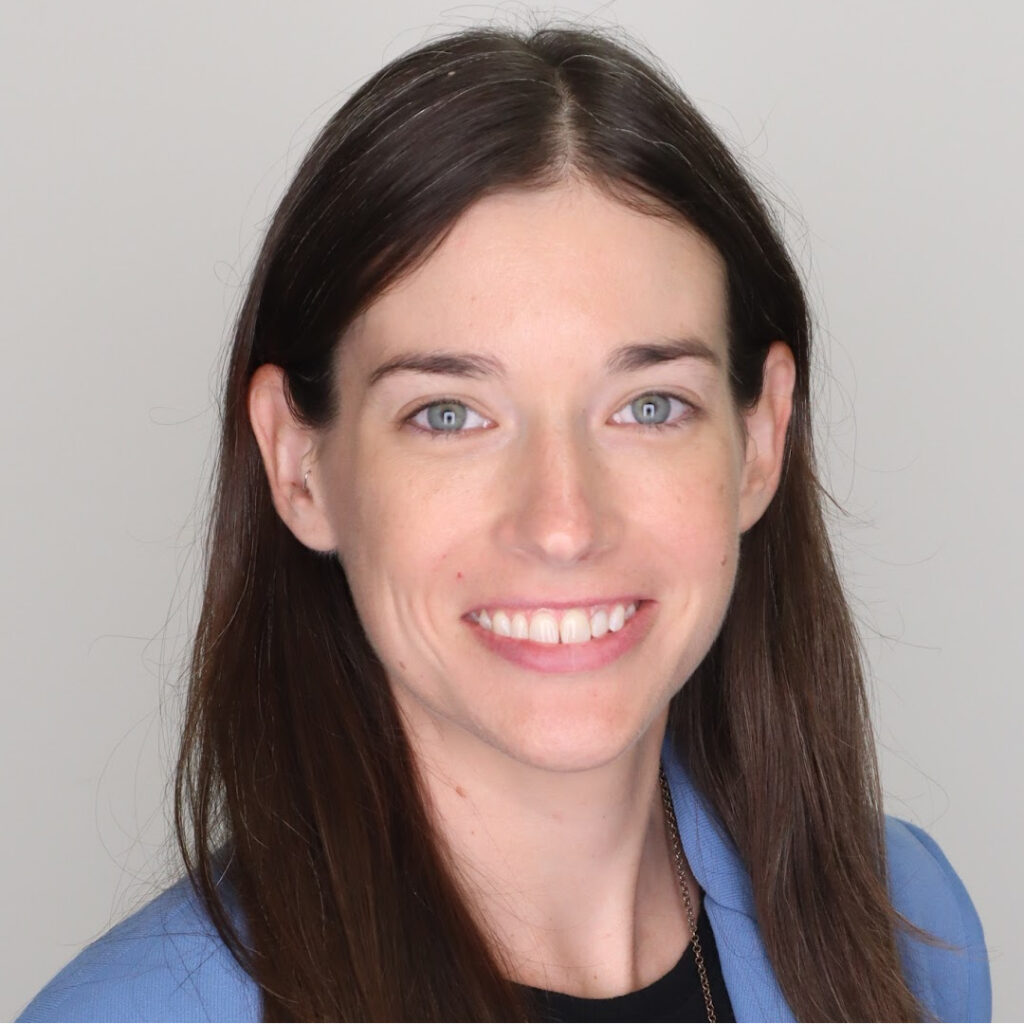
Through experiences like collaborations with state agencies on oyster reef and shoreline restoration projects, I have seen that long-term collaborations, which foster open communication between scientists and managers, are the best approach to addressing complex marine and coastal issues.
Michelle Shaffer
Michelle Shaffer
University of Central Florida
Legislative Branch
Michelle Shaffer is a Ph.D candidate in Integrative and Conservation Biology at the University of Central Florida, under advisor Dr. Kristy A. Lewis and Dr. Michelle Gaither. She was selected as a 2023 Florida Sea Grant Graduate Student Coastal and Ocean Fellow and is currently researching historic estuarine ecosystems by developing present-day and archaeological food web models to compare ecosystem conditions over time. As a part of this project, Shaffer and her research team are collaborating with the University of British Columbia and learning from their work with the səl̓ilwətaɬ (Tsleil-Waututh) Nation.
“The goal of this research is to provide resource managers with a broader perspective of ecosystem condition and ecosystem baselines used in decision-making while demonstrating that underutilized forms of scientific data in ecology can provide valuable insights when working across disciplines and with traditional ecological knowledge,” says Shaffer.
The Knauss Marine Policy Fellowship offers Shaffer an opportunity to combine her communication skills, paired with her mentorship abilities, deepen her understanding of the policy process, and explore the dynamics between scientists and policymakers through Knauss’s extensive network.
Her dedication to public outreach began as a docent at an avian rehabilitation center. As an undergraduate and later as an outreach supervisor, she helped organize numerous K-12 events, including story-telling yoga and mangrove propagule potting to showcase local estuarine conservation methods. She also co-authored a children’s book on the role of oyster reefs in supporting avian communities.
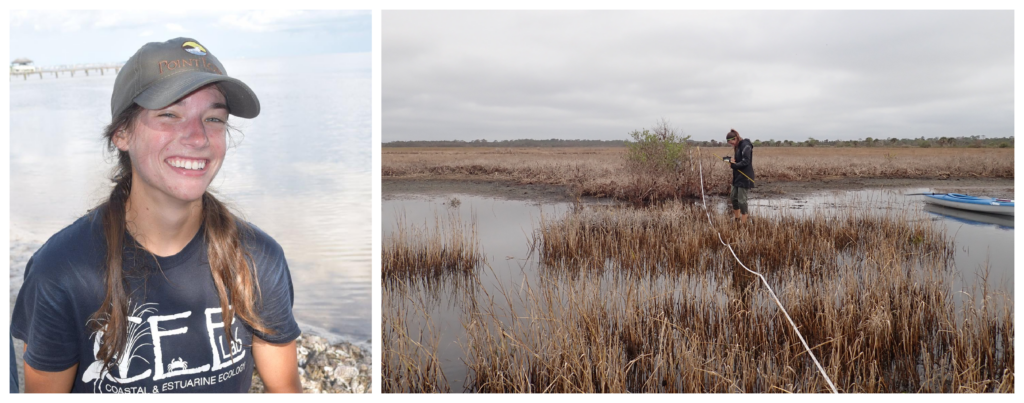
Shaffer worked on various research and restoration projects along Florida’s east coast and helped develop models for estuarine food webs in the Gulf of Mexico to evaluate ecosystem resilience to the Deepwater Horizon oil spill. She helped establish a baseline dataset on shoreline characteristics in the Indian River Lagoon, which has been used in the development of a restoration suitability model. Additionally, her research and oral presentation on oyster restoration and mangrove range expansion received recognition at the 2016 “Sharing Our Research with Everyone on the IRL” (ShORE) Symposium.
“Through this work and other collaborative restoration projects with state agencies, I saw the direct impact scientific research can have on policy decisions. These experiences have helped fuel my passion for bridging the gap between science and policy implementation.”
Shaffer has also embraced public service in her professional and academic pursuits. As a member of the American Fisheries Society’s Florida Chapter’s Community and Engagement Committee, she has supported initiatives to address inclusivity challenges in the fisheries profession. She served as secretary and event coordinator for the Graduate Student Association at UCF and has mentored 13 undergraduates in estuarine research. Additionally, she provided evidence-based advice through a NOAA-funded project, creating a decision-support tool that modeled the impacts of nutrient reduction on marine food webs in the northern Gulf of Mexico for policymakers.
With a passion for making science-based knowledge accessible to support coastal and ecosystem resilience, the Knauss Fellowship will allow Shaffer to gain valuable experience through public-facing programs and collaboration with policymakers. In this role, she can leverage her strengths in applied ecology and communication while also engaging with a diverse range of individuals on projects that inform marine policy.
What is Michelle most looking forward to as a 2025 Knauss Fellow?
“My professional background is mainly in scientific research, so I am excited to learn about policy, connect with new people, and gain new experiences during the Knauss Fellowship.”
Placement Office:
Legislative Branch, Office of Senator Adam Schiff (D-CA)
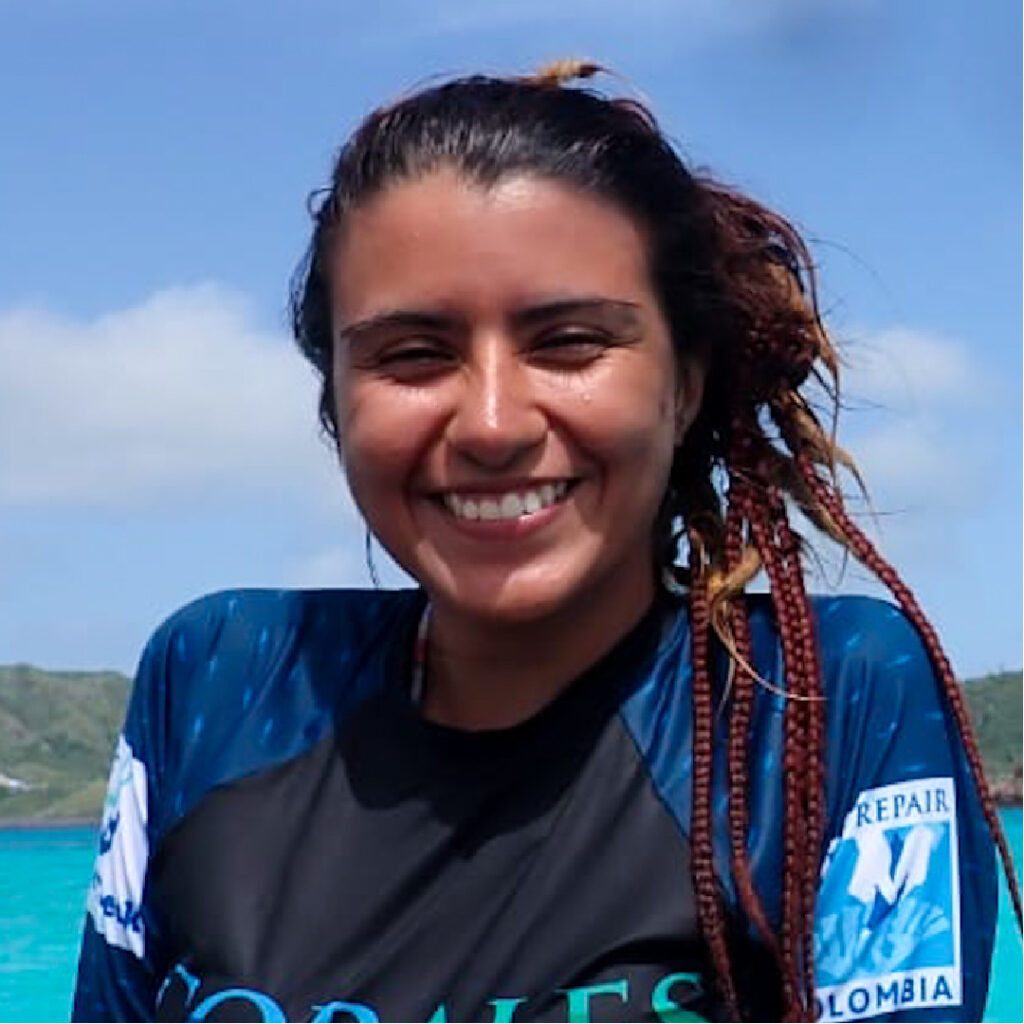
I am enthusiastic about the prospect of developing ocean environmental policies and education programs tailored for inclusion in school curriculums, particularly within communities that coexist with marine systems.
Natalia Uribe-Castañeda
Natalia Uribe-Castañeda
University of Central Florida
Executive Branch
Natalia Uribe-Castañeda is a University of Florida Ph.D. graduate from Colombia, who recently obtained her Ph.D. in Interdisciplinary Ecology, under advisor Dr. Martin Main in UF’s School of Natural Resources and Environment (SNRE). Uribe-Castañeda’s dissertation, titled “Community Engagement in Coral Reef Restoration”, investigates strategies that organizations use to engage communities, assess community-based coral reef restoration programs, highlight the motivations of community member participation, and identify barriers members face that hinder their participation.
“This commitment has led me to work and study across various countries, including Colombia, the United States, Belize, Peru, Ecuador, Brazil, Uruguay, Mexico, Portugal, Spain, and Italy,” says Uribe-Castañeda
During her tenure as a Marine and Coastal Program Consultant with the World Wildlife Fund Colombia, Uribe-Castañeda’s understanding of the importance of integrative management in coastal ecosystems grew and launched her career in several international roles thereafter. In 2018 she spent time in Faro, Portugal with Future Earth Coasts as a Research Assistant, constructing frameworks to analyze coral reef socio-ecological systems. As a Coral Reef Lecturer with Operation Wallacea in Akumal, Mexico the following year, she conducted underwater lectures and planned dive operations related to reef ecology. These opportunities, among others, provided her with the background and expertise to complement her academic research and enhance her passion for public service.
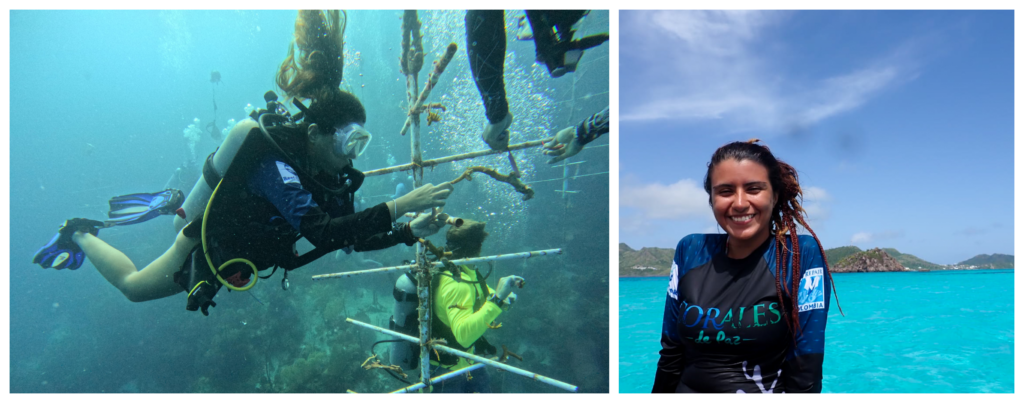
Whether in her home country of Colombia, around the globe, or here in Florida, Uribe-Castañeda does not shrink from taking on leadership roles that provide pathways to change. During her academic career at the University of Florida, she served as president, vice president, and treasurer of the SNRE Graduate Student Council and the Tropical Conservation and Development Program. In these roles, she facilitated grant eligibility and organized fundraising events to support students’ research. She also engages with stakeholders to strategize ways to promote greater accessibility with grant opportunities.
“This blend of hands-on engagement with communities, research findings,
and leadership experiences underscores my commitment to contribute to public service actively,” says Uribe-Castañeda.
Looking forward to 2025, the Knauss Fellowship would not only allow to share her interdisciplinary and international expertise, but also provides the opportunity for hands-on policy and administrative learning while engaging with executive and legislative offices in a collaborative environment. Uribe-Castañeda is dedicated to leveraging science to empower coastal communities and their voices, and advocates for policies that both support coral reef restoration and actively engage reef-related businesses. In her role in the 2025 Knauss cohort, she will build upon her expertise and find new ways to continue and enhance her advocacy efforts.
What is Natalia most looking forward to as a 2025 Knauss Fellow?
“I want to gain a comprehensive understanding of ocean conservation and management from various perspectives”
Placement Office:
NOAA OMAO, Uncrewed Systems Operation Center
The 2025 Knauss Fellowship cohort will begin their work in February 2025. Florida Sea Grant will be sharing their experiences throughout the year and invite you to join us in following their journeys on this next phase of their careers.
Read the full press release from the National Sea Grant Office (NSGO) to learn more about the 88 finalists for the 2025 Knauss Fellowship Cohort. And to follow along with the 2025 Florida Sea Grant cohort, consider signing up for our Sea Scholars Student Newsletter.
Interested in learning more about the 2026 Knauss Fellowship Program? Reach out to Cassie Sexson at fsg-students@ifas.ufl.edu to discuss if the fellowship would be a good fit for you. Florida Sea Grant will also be hosting an information session via zoom on the 2026 program on Monday, December 16, 2024. Registration is required to attend.